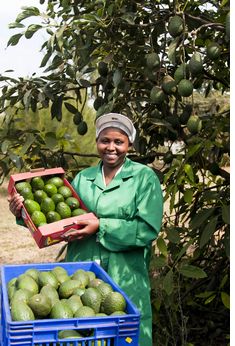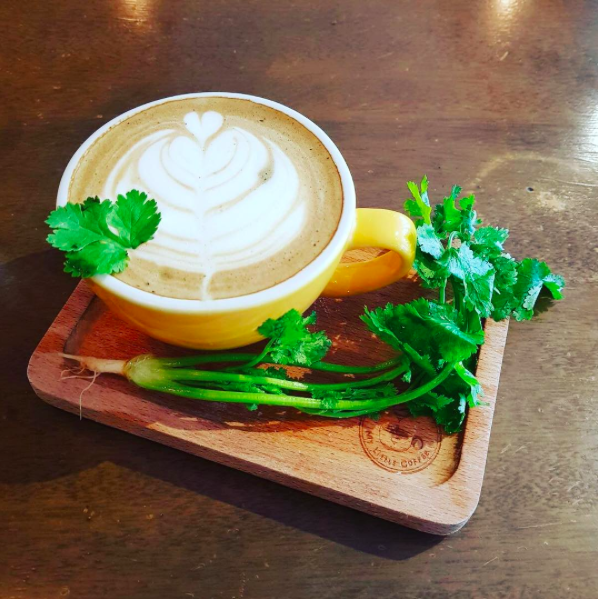Africa will plant avocados instead of coffee beans

For professional baristas, please follow the coffee workshop (Wechat official account cafe_style)
British investor Camellia Plc owns a majority stake in the Kenyan company. At first, Kakuzi was a sisal plantation and then began to produce coffee. When Camellia invested money in the company, the company mainly produced coffee. But now coffee production has been replaced by avocados and macadamia fruits. In addition, the company also grows small-scale pineapples and is involved in forestry and animal husbandry.
"apart from coffee, we saw opportunities to grow other products, so we decided to diversify our production." Said Graham McLean, general manager of agriculture at Camellia. Over the years, the international coffee market has been less and less profitable for Kenya's large commercial growers. Overall, 80 per cent of global coffee production is produced by 25 million small farmers who sell coffee at any price, making it more difficult for large businesses to produce. "We have gradually replaced coffee production with avocados and macadamia fruits." The process of elimination is gradual. First, avocado trees are planted, and finally, the coffee trees are replaced by Hawaiian fruit trees. "now there are a variety of crops on the Kakuzi plantation."
Hass avocado for the international market
Last year, the company harvested 7100 tons of avocados from 515 hectares of avocado-growing land. Last year, small growers who joined Kakuzi harvested 1800 tons of avocados. "Haas avocado is the most demanding variety in the avocado market, and demand is rising, so it is definitely a good choice to start growing avocados." Graham went on. The company sells Hass and Fuerte avocados, and 90 per cent of the Hass avocados used for export go to France. The rest are in the rest of the European Union, Britain, Switzerland and Northern Europe.
Although the Kenyan avocado market is not very large, a small number of avocados that do not meet the export requirements will be supplied to the domestic market. Unlike pineapple cultivation, pineapple yields less than avocado. "for pineapples, the focus is on the domestic market. Kakuzi supplies all pineapples to the domestic market. "
The growing market attracts investment
Fruit cultivation is an attractive market for investment. Graham explained: "due to the growing world population and increasing demand, the demand for fruit continues to grow. Superfoods such as avocados, berries and nuts seem to be an infinitely growing market, coupled with emerging Asian markets, demand will only continue to rise. " In addition to being attractive to investors, consumer interest in agriculture is also increasing. "consumers are more interested in product sources, which is why everything needs to go smoothly." Graham refers to the necessary certificates for planting and social environment of the planting company.
Don't be eager for quick success and quick profit in investing in agriculture
However, investment in agriculture requires a long-term perspective. "We have a long-term concept of investment. We see ourselves as custodians of future generations' assets, with the goal of continuously improving these projects for future generations. We do have a long-term vision. " Graham continued, "you can't invest in agriculture with the idea of being eager for quick success and quick profit."
By diversifying the investment, the risk of investing in agriculture is reduced as much as possible. Camellia is interested in the cultivation of tea, rubber, citrus and soybeans, and he has also invested in grape cultivation and production (Linton Park Wines). In addition, the company also invests in various engineering, food service / logistics companies. "We have a 'global footprint'." "mitigate the consequences of climate, price, exchange rate, political and other risks associated with agricultural investment," Graham explained.
Politics and agriculture are always linked. Political issues always play a role, says Graham, whether growers are in the US, Europe or Africa. "it's a part of life. Just like the weather, there is a good and bad political environment, and they all change alternately. " Camellia's investment activities in Africa are located in Kenya, Malawi and South Africa, which are relatively stable countries on the continent.
Important Notice :
前街咖啡 FrontStreet Coffee has moved to new addredd:
FrontStreet Coffee Address: 315,Donghua East Road,GuangZhou
Tel:020 38364473
- Prev

[coriander coffee] is it really dark cuisine? Don't you put coriander in your coffee?
Professional barista communication please pay attention to the coffee workshop (Wechat official account cafe_style) coriander alias: coriander, raw coriander, garden coriander, kudzu, all over the sky, salt cooked vegetables in recent years, the Japanese parsley wind is really getting stronger and stronger, can not stop. Crazy coriander flavor food from coriander cup noodles and ramen to
- Next

The siphon Coffee contest was tested by the Japanese champion in Kaohsiung today.
For the exchange of professional baristas, please follow the coffee workshop (Wechat official account cafe_style). Last year, Japanese champion Satoshi Sato demonstrated siphon coffee. The Kaohsiung International Food Exhibition will be on display at the Kaohsiung Exhibition Hall from tomorrow to the 29th. The exhibition will focus on the "World Cup siphon Coffee Competition". This afternoon, we will first have an exchange of Taiwan and Japanese champions at the Kaohsiung State Guest Hotel. 2017 Taiwan representative Yang Yishan and last year.
Related
- Unexpected! Ruixing Telunsu lattes use a smoothie machine to foam milk?!
- % Arabia's first store in Henan opens into the village?! Netizen: Thought it was P's
- Does an authentic standard mocha coffee recipe use chocolate sauce or powder? Mocha Latte/Dirty Coffee/Salty Mocha Coffee Recipe Share!
- What is the difference between Vietnam egg coffee and Norway egg coffee? Hand-brewed single product coffee filter paper filter cloth filter flat solution!
- What is the difference between sun-cured and honey-treated coffee? What are the differences in the flavor characteristics of sun-honey coffee?
- How to make Italian latte! How much milk does a standard latte use/what should the ratio of coffee to milk be?
- How to make butter American/butter latte/butter Dirty coffee? Is hand-brewed coffee good with butter?
- Is Dirty the cold version of Australian White? What is the difference between dirty coffee/decent coffee and Australian white espresso?
- Relationship between brewing time and coffee extraction parameters How to make the brewing time fall to 2 minutes?
- Got entangled?! Lucky opens a new store, Mixue Ice City, and pursues it as a neighbor!

